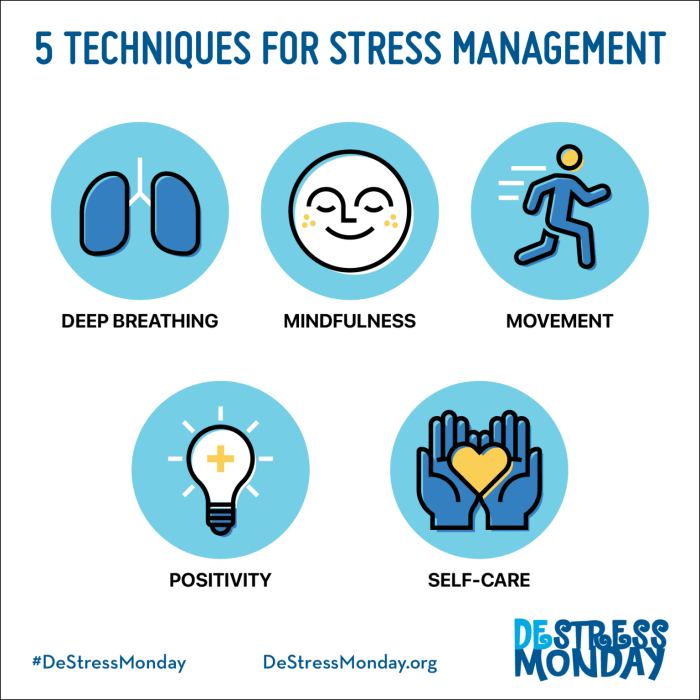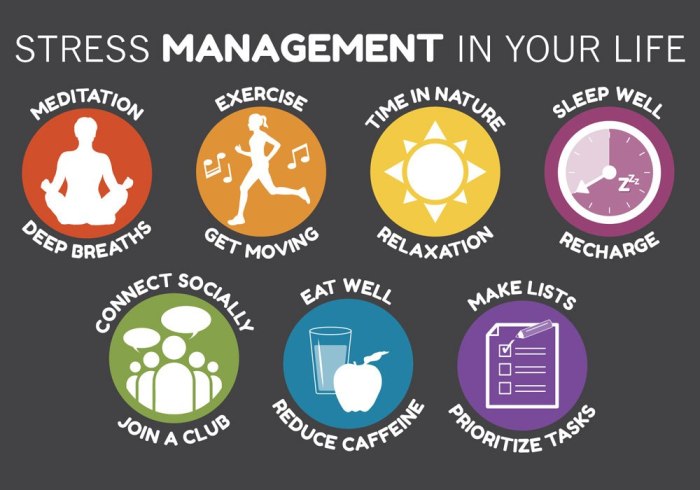Kicking off with Stress Management Tips, this opening paragraph is designed to captivate and engage the readers, setting the tone for some real talk about keeping stress in check.
When it comes to managing stress, it’s essential to have a toolkit of strategies that work for you. From physical activities to mindfulness techniques, there are various ways to keep your cool in the face of everyday challenges.
Introduction to Stress Management Tips

Stress management is the practice of utilizing techniques and strategies to cope with and reduce stress in daily life. In today’s fast-paced world, stress has become a common part of life, affecting both physical and mental well-being. It is essential to incorporate stress management tips to maintain a healthy balance and promote overall wellness.
Yo, have you ever tried some mindfulness exercises to chill out and relax? It’s all about focusing on the present moment and clearing your mind from all the stress and drama. Whether it’s deep breathing, meditation, or just taking a walk in nature, these exercises can really help you feel more centered and at peace. Give it a shot and see how it vibes with you!
Benefits of Incorporating Stress Management Techniques
- Improved Mental Health: By managing stress effectively, individuals can reduce anxiety, depression, and other mental health issues.
- Enhanced Physical Health: Lowering stress levels can lead to better immune function, decreased risk of chronic diseases, and improved overall physical health.
- Increased Productivity: When stress is managed, individuals can focus better, make clear decisions, and be more productive in their daily tasks.
- Better Relationships: Managing stress can improve communication, empathy, and overall relationships with family, friends, and colleagues.
Real-life Examples of Positive Impact of Stress Management
- John, a busy executive, started practicing mindfulness and meditation daily. As a result, he experienced reduced stress levels, improved focus at work, and better work-life balance.
- Sara, a college student, incorporated exercise and time management techniques to manage her academic stress. She noticed increased energy levels, better grades, and improved overall well-being.
- Mark, a parent juggling work and family responsibilities, started setting boundaries and practicing self-care. This helped him reduce burnout, improve his relationship with his family, and find joy in everyday activities.
Physical Stress Management Techniques

Physical activities play a crucial role in reducing stress levels. Engaging in regular exercise can help release endorphins, improve mood, and promote overall well-being. Here are some effective physical stress management techniques:
1. Cardiovascular Exercise
- Activities such as running, cycling, or swimming can help elevate heart rate and release endorphins, which are natural mood boosters.
- Start with a brisk walk for 30 minutes a day and gradually increase the intensity and duration of your cardiovascular workouts.
- Remember to warm up and cool down properly to prevent injuries and maximize the benefits of exercise.
2. Yoga and Pilates
- Yoga and Pilates focus on breathing techniques, stretching, and relaxation, which can help reduce muscle tension and promote mindfulness.
- Join a local class or follow online tutorials to learn different poses and sequences that can alleviate stress and improve flexibility.
- Practice deep breathing exercises during yoga sessions to calm the mind and reduce anxiety.
3. Strength Training
- Lifting weights or using resistance bands can help build muscle strength, improve posture, and boost self-confidence.
- Include compound exercises like squats, deadlifts, and bench presses in your routine to engage multiple muscle groups simultaneously.
- Consult a fitness trainer to create a personalized strength training program that suits your fitness level and goals.
Mental Stress Management Strategies
Managing mental stress is crucial for overall well-being. By incorporating mindfulness and meditation techniques into your daily routine, you can effectively reduce stress levels and improve mental clarity.
Mindfulness and Meditation
- Practicing mindfulness involves being fully present in the moment, paying attention to thoughts and feelings without judgment. This can help reduce anxiety and promote a sense of calm.
- Meditation techniques, such as focused breathing or guided imagery, can help quiet the mind and increase self-awareness. Regular meditation practice has been shown to lower stress levels and improve cognitive function.
- Combining mindfulness with meditation can create a powerful stress management tool that can be practiced anywhere, anytime.
Cognitive Reframing
- Cognitive reframing involves changing the way you perceive and interpret stressful situations. By shifting your perspective and focusing on positive aspects, you can reduce the impact of stress on your mental well-being.
- Identifying and challenging negative thought patterns can help reframe your mindset and promote a more optimistic outlook on life.
- Practicing cognitive reframing regularly can lead to a more resilient mindset and better coping mechanisms for dealing with stress.
Personal Experiences
“After incorporating mindfulness and meditation into my daily routine, I noticed a significant decrease in my stress levels and an increase in my overall sense of well-being. Cognitive reframing has also helped me shift my perspective on challenging situations, allowing me to approach them with a more positive mindset.”
Emotional Stress Management Tips
Emotional stress can be triggered by a variety of factors, such as relationships, work pressures, or unresolved issues. It is crucial to identify these triggers in order to address them effectively and prevent them from escalating.Emotional self-care plays a vital role in stress management. This involves taking the time to prioritize your mental well-being, practicing self-compassion, and seeking support when needed.
By nurturing your emotional health, you can build resilience and better cope with stressors.
Identifying Triggers and Addressing Them
- Keep a journal to track patterns of emotional stress triggers.
- Practice mindfulness techniques to stay present and aware of your emotions.
- Seek therapy or counseling to address underlying issues causing emotional stress.
- Engage in open communication with loved ones to resolve conflicts and misunderstandings.
Importance of Emotional Self-Care, Stress Management Tips
- Set boundaries to protect your emotional well-being and prioritize self-care activities.
- Practice relaxation techniques like deep breathing, meditation, or yoga to reduce emotional tension.
- Engage in hobbies and activities that bring you joy and fulfillment.
- Connect with a support network of friends, family, or mental health professionals.
Healthy Emotional Outlets for Managing Stress
- Express your emotions through creative outlets like art, music, or writing.
- Engage in physical exercise to release pent-up emotions and boost endorphins.
- Practice gratitude by focusing on the positive aspects of your life and expressing appreciation.
- Volunteer or help others in need to shift your focus from internal stressors to external contributions.
Hey, have you ever tried mindfulness exercises ? They’re super helpful in reducing stress and improving focus. Whether it’s deep breathing, meditation, or body scans, these exercises can really help you stay grounded and present in the moment. Give it a shot and see how it can positively impact your day!